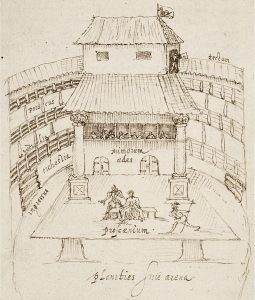The fact that Lady Mary Wroth is a female contemporary of Shakespeare disproves Virginia Woolf’s view that any sister of Shakespeare could not have written drama.
Love’s Victory is a powerful starting point for reviewing women’s history and theatre history.
On 18th October 2018 Year 12 students from Miss Creaney’s English Literature class at Archbishop’s School, Canterbury worked on a comparison of the supernatural characters of the ghost in Shakespeare’s Hamlet with Venus and Cupid in Lady Mary Wroth’s Love’s Victory with Professor Alison Findlay.
We know that the ghost in Hamlet is an equivocal presence and this is reflected in both script and staging. Horatio calls it ‘this thing’; after speaking to it, Hamlet calls on ‘all the host of heaven!’ then ‘O earth!’ and ends ‘What else? / And shall I couple hell?’
He refers here to three areas symbolised by the different levels in the early modern theatre. At the top was the heavens, from which actors playing gods were lowered. Wealthy spectators also occupied this heavenly realm, sitting in the ‘Lords’ room’ or balcony above the stage. The stage itself was the earthly realm and the lowest level – under the stage, was hell. Spectators who paid only a penny shared this ‘base’ level, standing as ‘groundlings’ in the ‘pit’.

The heavens. Hamlet refers to the canopy over the stage which was painted with stars to signify the sky, as a ‘brave o’erhanging firmament, this majestical roof, fretted with golden fire’ [Q2]
The earth Hamlet refers to the stage as ‘this goodly frame the earth’, a ‘promontory’ which stretches out into the sea of spectators’ heads.
Hell When it demands ‘Swear’ from beneath the stage, the ghost is associated with underworld of ‘perturbed spirits’, the purgatory of Catholic faith that has been demonised by Protestant reformers. Hamlet calls the ghost ‘old mole’, asking ‘can’st work in the earth so fast?’ Devils entered from here through trapdoors, and its positioning must encourage Hamlet’s suspicion that it too is ‘the devil’ (2.2.376
We read through the opening scene of Wroth’s Love’s Victory in pairs to see what contrasts we could find between her divine figures, Venus and Cupid, and the ghost in Hamlet.
Archbishop’s students reading through the dialogue in pairs
‘I like the way women are in a position of power. It was interesting how different and similar they are’
‘Lady Mary Wroth is excellent at creating a dramatic relationship as we see Venus as a god which would have made the play interesting as many saw God as male.’
We then applied De Witt’s vertical model of spiritual and social hierarchy to consider how Wroth’s divine figures might be staged. The opening stage direction says they appear ‘in her Temple, her Priests attending her,’ but on their next appearance, Wroth directs them ‘appearing in the clouds’. To explore this, we read the scene using desks, chairs and a window sill to create different levels.
Oliver Gaskin and Andrew Cunningham read opening lines
Venus. Cupid, me thinks we have too long been still
And that these people grow to scorn our will.
Mercy to those ungrateful breeds neglect;
Then let us grow our greatness to respect.
Make them acknowledge that our heavenly power
Can not their strength but even themselves devour.
Let them not smile and laugh because thine eyes
Are covered as if blind, or love despise.
Grace Apps and Stuart Cunningham used chairs to present a more intimate style between mother and son as Venus says ‘Thou shalt discern their hearts, and make them know / That humble homage unto thee they owe;’
Stuart Cunningham pointed out that Wroth ‘makes the mother think she is more powerful but she is a little inferior to her son’
Wound them but kill them not, so may they live
To honour thee, and thankfulness to give.
Shun no great cross which may their crosses breed
But yet let blessed enjoying them succeed.
‘The positioning is effective, having certain characters higher than others gives a good effect’
Cupid. Mother, I will no cross, no harm forbear
Of jealousy, for loss, of grief, or fear
Which may my honour touched again repair,
But with their sorrows will my glory rear.
Friends shall mistrust their friends, lovers mistake,
And all shall for their folly woes partake.
Some shall love much yet shall no love enjoy,
Others obtain when lost is all their joy.
Mia Smith and Goran Spitz read dialogue
Mia Smith (16), as Cupid, promises ‘your will and mind to serve’ to bring ‘triumph’ to Venus and Goran Spitz (15) as Venus assuredly predicts
‘Then shall we have again our ancient glory,
And let this callèd be love’s victory
Triumphs upon their travails shall ascend,
And yet most happy ere they come to end’.
Mia observed ‘certain words made me want to emphasise for meaning’
Cupid. Joy and enjoying on some shall be set
Sorrow on others caught by Cupid’s net.
‘The rhyming couplets show how Cupid is obedient and trapped by Venus’s words, and I found that interesting’
‘Performing it made me notice the placement and power imbalance between characters.’
Comments on comparing the two texts:
‘Makes a change from Shakespeare; fresh and new’ (Oliver Gaskin)
‘I found it interesting and eye-opening. It has made me want to look at the relationships in Hamlet in more depth’ (Mia Smith)
‘I think this play would entertain anyone on English A Level. Comparisons and differences between them gives good content for us to use in our answers’ (Stuart Cunningham)
I found the difference between male and female writers very interesting and how being a woman affected the way Lady Mary Wroth wrote.’
‘I have enjoyed today’s session and have learnt that Shakespeare was not the only powerful playwright’
Professor Alison Findlay (Lancaster University), Dr. Marion O’Connor and Professor Catherine Richardson (University of Kent) screened The Urania Company’s production to students of Archbishop’s on the 6th December 2018.







You must be logged in to post a comment.